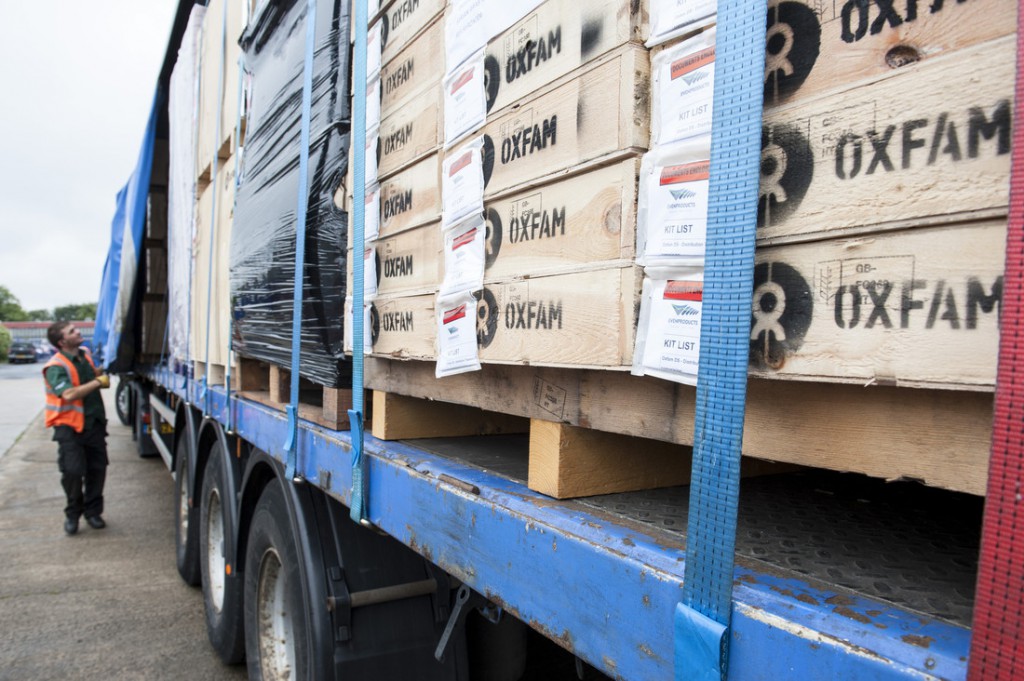Donors in Kuwait must fund both Syrians and neighbors
The UN’s largest-ever aid appeal, $6.5 billion for Syrians, is crucial for humanitarian needs in the region.
Gareth Price-Jones is the Humanitarian Affairs Representative for Oxfam in Geneva and Country Director for Syria. This is a cross-post from Syria Deeply, an independent digital media project.
The numbers are staggering and nearly impossible to visualize. Nine million? That’s the number of people in Syria in need of humanitarian assistance. Nearly seven million? That’s the number of people inside Syria who have been displaced from their homes. 2.3 million? Syrian refugees, spread throughout the Middle East living in refugee camps, abandoned buildings and other makeshift shelters.
Donor governments have come today to Kuwait to pledge money toward the UN’s largest-ever aid appeal, $6.5 billion for water, food, medical care, shelter, housing and other essentials for Syrians in 2014. I’ve come here from Damascus, and from what I know even $6.5bn is an underestimate. Vital projects have been lopped off this appeal because finding enough money to pay for everything that Syria needs was felt to be totally unrealistic.
Relative to the needs of the Syrian people, or the profits of Apple, or to what was paid to rescue the banks, a smart and passionate world can easily find $6.5 billion for Syria. Every penny raised will make a difference for many people who have lost everything. These people until very recently lived lives exactly the same as those in all other developed countries in the world. Peaceful. Connected. Sophisticated. Modern. Bustling. Now many don’t even have running water, or local shops selling food. Syria has lost decades of development.

In June I moved to a new job in Geneva, as Oxfam’s Humanitarian Affairs Representative. In October I was seconded to Damascus to run our program there, now providing 9.2 million litres of water per day to people in Damascus and Rif Damascus, and shortly to people in Hama and Homs as well. The contrast between the discussions in Geneva (and indeed, here in the Bayan Palace in Kuwait), and the realities that over half the Syrian population are facing, is stark.
Our work in Syria is fraught with difficulties. Things that should take hours take days. Unlike most humanitarian situations I am largely unable to talk to local communities about what people their most need, and so whether we are making the right responses. But in Syria and across the region, assistance is still getting through, albeit squeezed by constraints that make professional humanitarians wince. Humanitarian aid is making a massive difference to people in Syria and across the region.
Donors’ money must also go to neighboring countries that are hosting Syria’s refugees. There are thousands of communities in Jordan, Lebanon, Iraq and Turkey that also need our help to bear the burden of that this crisis is having on them. Our “Fair Shares” analysis on how much countries are giving to aid in the humanitarian effort shows just how much these countries are giving to meet the needs for Syrian refugees: Jordan’s given 12,720% of their fair share, Lebanon: 5,617%, Iraq: 450%, and Turkey: 930% – spanning the last two years with more to come this year. The national response plans regional countries have put forward address the challenges facing host communities and aim to bolster funds for infrastructure and social services, even more necessary considering the impact it is having on these countries in hosting huge numbers of refugees.
Money is critical but it doesn’t solve the problem. We’re now approaching the three year anniversary of the conflict – a grim anniversary – and what Syria needs most is an end to the fighting. Many donor governments here today will be next week attending the peace talks in Switzerland, which offer the best opportunity of ending the conflict. But there’s a missing link there too – the voices of women and of civil society groups. Civil society has taken on a huge burden of helping Syrian people and promoting peace-making but has found itself frozen out of talks on the future of Syria. The peace talks simply won’t work unless everyone involved in the conflict and all those who intend to play a major role in Syria’s reconstruction are offer space at the peace table.
The road ahead for Syria is difficult. Even after the conflict does end it will take refugees years to return and rebuild their homes and livelihoods. Syria’s humanitarian needs will keep growing as the fighting rages on. As UN Secretary-General Ban Ki-Moon said at the start of the conference today, “the fighting has set Syria back by years, even decades.” It’s crucial that the international community step up for Syria both by making satisfactory pledges in Kuwait and by successful diplomacy next week in Geneva. Then we can start the real work.